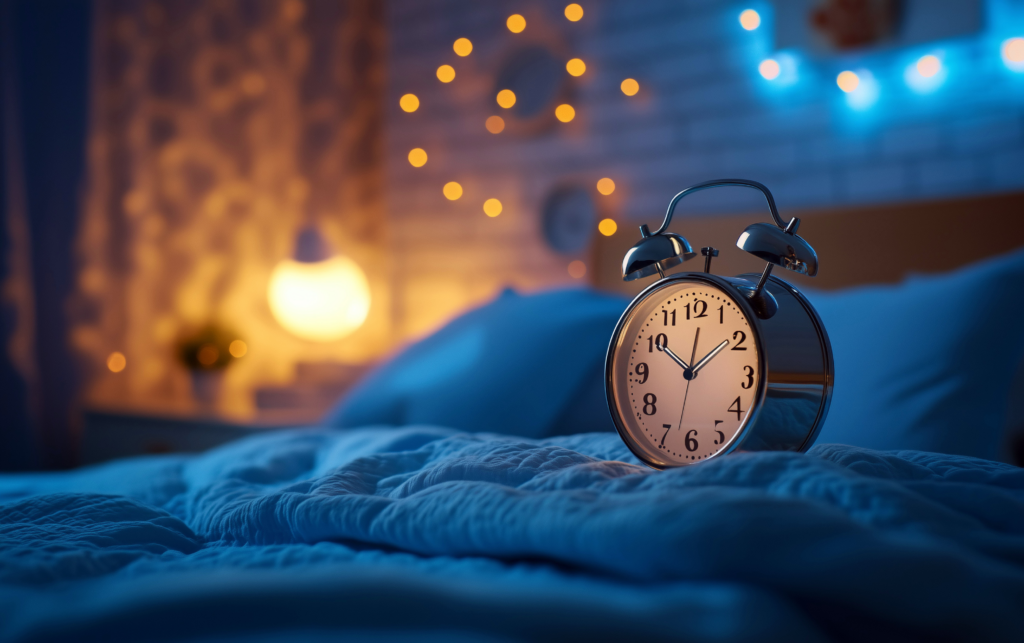When it comes to weight loss, you’ve probably heard it all: calorie counting, keto, HIIT workouts, and even GLP-1 medications (like semaglutide). But have you ever considered the role your internal clock plays in your success? Your circadian rhythm—the body’s natural 24-hour cycle—can significantly impact your weight loss journey. Let’s dive into what your circadian rhythm is, how it affects weight loss, and how you can use it to your advantage.
What Is Your Circadian Rhythm?
Your body’s internal clock, known as the circadian rhythm, plays a powerful role in regulating hormones that impact your weight. Hormones like melatonin, cortisol, growth hormone, leptin, ghrelin, thyroid hormone, and insulin are all influenced by your circadian rhythm. When this natural rhythm is disrupted, it can lead to challenges with weight gain and difficulty maintaining a healthy weight.
Here’s how it works: your circadian rhythm is regulated by signals in your environment, including light. For example, when light enters your eyes in the morning, it tells your brain to stop producing melatonin—the hormone that promotes sleep—and to prepare your body for the day ahead. This is why prioritizing good sleep hygiene is so important for your overall health and weight management.
How Does It Affect Weight Loss?
Food as a Time Cue
Did you know that the timing of your meals can “reset” your circadian clock? Eating consistently at the same time each day helps regulate digestion and metabolism. Irregular meal schedules can confuse your internal clock, leading to inefficient calorie use and weight gain.
Burns Calories Naturally
Your body is better at turning food into energy earlier in the day. This means the calories you eat at breakfast are more likely to be burned off, while the ones you eat late at night are more likely to be stored as fat.
Boosts Gut Health
Your circadian rhythm plays a vital role in gut health, which significantly impacts weight management. Eating late at night can disrupt the gut microbiome, leading to imbalances and increased inflammation—factors associated with weight gain. Maintaining a healthy circadian rhythm helps support a balanced gut microbiome, promoting better digestion and metabolic health, which can make weight management more achievable.
Decreases Fat Storage
Your body processes sugar more effectively earlier in the day when insulin sensitivity is at its peak. Eating sugary or carbohydrate-rich meals in the evening can result in higher blood sugar levels, making it more likely for those calories to be stored as fat rather than burned for energy.
Tips to Align Your Weight Loss Goals with Your Circadian Rhythm
If you’ve been feeling like your weight loss efforts are an uphill battle, it might be time to work with your body instead of against it. Here’s how:
Create a Consistent Sleep Routine
Your sleep schedule affects more than just your mood—it directly impacts weight. Inconsistent sleep can lead to increased levels of cortisol (the stress hormone) and cravings for high-calorie foods. Aim for 7-9 hours of quality sleep each night and stick to the same bedtime and wake-up schedule.
Time Your Meals Wisely
- Eat Earlier in the Day: Front-load your calorie intake by having a hearty breakfast and a balanced lunch. Your body is more efficient at metabolizing food in the morning and early afternoon.
- Limit Late-Night Eating: Avoid eating at least two hours before bed. Late-night snacks can disrupt your digestion and your sleep.
Optimize Your Morning Routine
Kickstart your day with habits that set your circadian rhythm. Get 15-20 minutes of sunlight exposure within an hour of waking up to reset your clock, boost alertness, and improve mood. Enjoy a hot cup of coffee with the blinds open or take the dogs for a morning walk.
Exercise at the Right Time
Your body’s natural energy levels rise and fall throughout the day. Exercise when you feel most alert—typically mid-morning to early afternoon—for maximum calorie burn. Evening workouts are fine, but avoid vigorous activity too close to bedtime, as it may disrupt sleep.
Sync your weight loss journey with your body’s natural rhythm. Book an appointment today to create a plan tailored just for you and your goals.

















